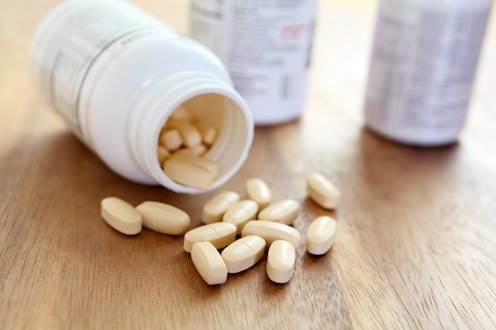Life
These Are The 6 Supplements Olympians Swear By
Some of the most talented athletes from all over the world have been tirelessly training — for years — in preparation for the 2018 Winter Games in Pyeongchang. With jam-packed schedules, Olympic athletes spend an impressive — almost incomprehensible — portion of their time rigorously training for the Olympics. Being an Olympic athlete requires so much endurance, so, how the athletes spend their off-time recuperating is just as important as practice itself: Bustle writer Megan Grant reported that a 2016 study revealed training only accounts for a mere 18 percent of actual performance. Just as importantly, Olympians striving for gold need to get eight to ten hours of restful sleep, and they need to fuel their bodies so they have the energy to participate. Of course, meal plans packed with nutrient-dense foods are a staple for Olympic athletes. However, many of them also rely on vitamin and mineral supplements to meet their nutritional needs. So what supplements do Olympians take?
Dr. Mike Israetel, PhD, is a U.S. Olympic Sports Nutrition Consultant and Head Science Consultant/Co-Founder of Renaissance Periodization, a training center for everything from people looking to get in better shape to actual Olympians. He tells Bustle that Olympic athletes often incorporate supplements into their regimens to give them their best shot at winning. "Supplements are not powerful aids to performance, but even a percentage point of improvement in performance can mean the difference between a gold medal and no medal at all when the competition is as closely contested as it is at the Olympics," says Dr. Israetel. Here are six supplements and adaptogens world class athletes use to up their game.
1Creatine
According to Healthline, creatine is a substance your muscles naturally produce during high intensity exercise, and gives you energy. The supplement is a favorite among weightlifters and gym goers, but Dr. Israetel tells Bustle that some Olympic athletes also use the supplement because it "can improve recovery between bouts of explosive performance, and can help build muscle."
2Electrolyte Supplements
In short, electrolytes are negatively and positively charged ions that play a super important role in your body — they help control nerve impulses, and regulate your bodily fluids, like sweat. "Electrolyte supplements can, with added fluids, greatly sustain hydration, and thus, high performance during long training sessions," explains Dr. Israetel. He adds that to receive the full benefit from electrolyte supplements, "training has to be very hard, and very long in duration in most cases." So while the average gym goer may not need electrolyte supplements, they can be advantageous for Olympic athletes who want to improve their performance.
3Carb Powders
Carbohydrates are one of your body's main sources of energy, and carb powders are a easy way to replenish and restore the energy you use while working out. Dr. Israetel says, "carb powders such as Gatorade and Powerade can help athletes get enough energy in to sustain hard workouts, and replenish energy stores between them."
But, much like electrolyte supplements, Dr. Israetel explains only folks who regularly do intensive athletic training will benefit from carb powders.
4Multivitamins
According to the National Institute of Health (NIH), multivitamin supplements can contain vitamins, minerals, or a combination of the two. Moreover, there are many types of multivitamins made for different age group, or for those with specific needs, like pregnant women.
Dr. Israetel says these supplements "round out essential needs that even well balanced diets don't cover 100 percent of the time." He explains that they not only help Olympic athletes, but that most people could benefit from taking a daily multivitamin to make sure their nutritional needs are met.
5Whey Protein
Whey protein is a popular sports supplement made from the by-product of cheese, and is packed with protein, as well as the nine essential amino acids. Dr. Israetel explains whey protein "helps get fast-digesting protein to muscles to prevent muscle loss during workouts, and helps the growth process after workouts."
While maintaining muscle mass is super important for world class athletes, whey protein may have additional benefits for the average person. Healthline reports studies have showed that whey protein has added benefits for everything from depression, to blood sugar, blood pressure, and treating symptoms of HIV.
6Omega-3/Fish Oil Supplements
According to the National Center For Complimentary and Integrative Health (NCCIH), Omega-3 fatty acids are "a group of polyunsaturated fatty acids that are important for a number of functions in the body," and they can be derived from fish, shellfish, and vegetable oils. Dr. Israetel says these fatty fish oil supplements can improve overall health, support muscle repair, and even improve brain function — especially for Olympic athletes who follow a more restrictive, low-fat meal plan. He adds that most everyone would benefit from taking a fish oil or Omega-3 supplement.
Supplements definitely won't single-handedly solve your health problems, but they can be a great tool to improve your physical wellness (and make up for potential deficiencies). While you may not need as many supplements as an Olympic athlete who intensively trains, understanding your supplement needs based on your activity level may give you the extra boost you want.
